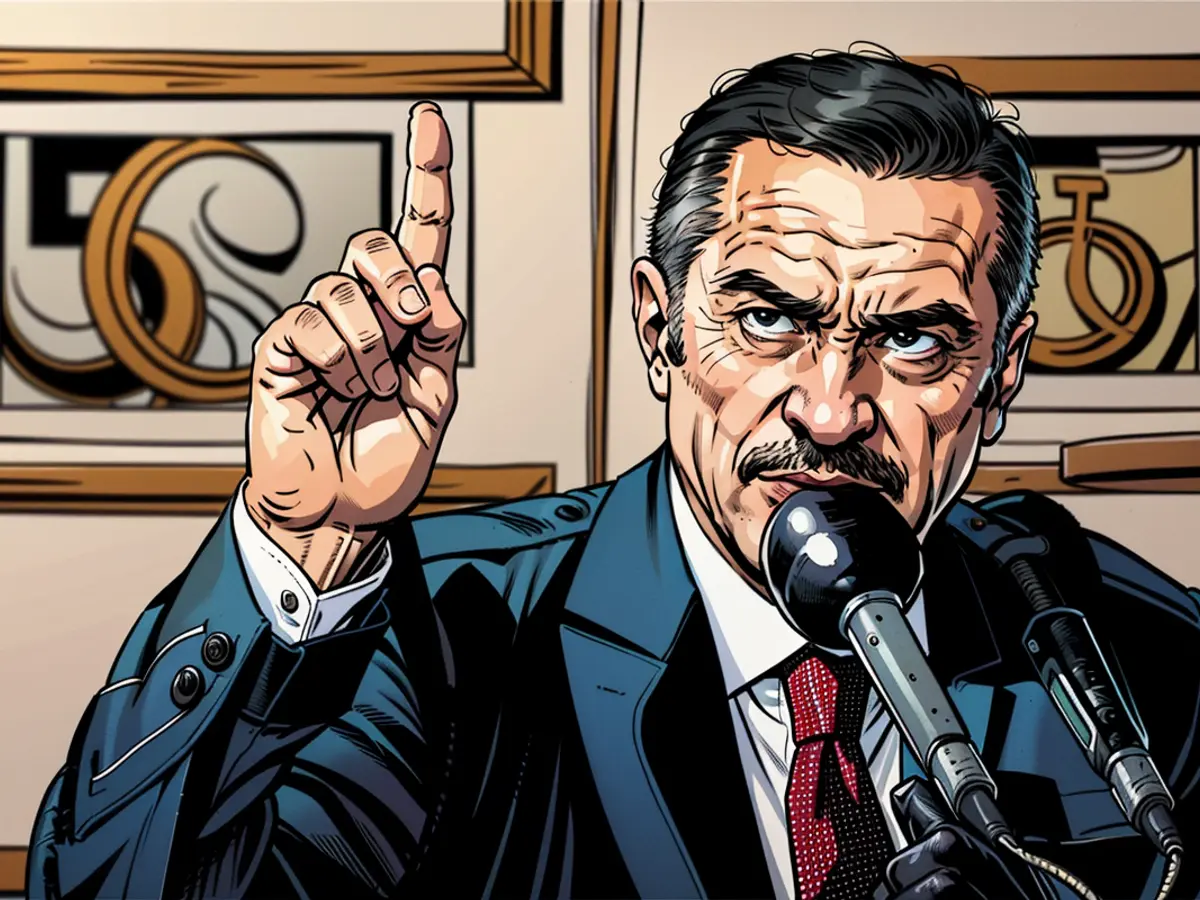Conflict with Hezbollah - Turkey and Israel threaten each other
Israel's Government Prepares for Retaliation against Hezbollah in Lebanon after Devastating Rocket Attack on Golan Heights
Israel's Government is preparing for a retaliation against Hezbollah in Lebanon following a devastating rocket attack on the Golan Heights. The Security Cabinet authorized Prime Minister Benjamin Netanyahu and Defense Minister Joav Galant to decide on the "method, manner, and timing" of action against the terrorist organization Hezbollah, according to the Prime Minister's Office statement in the evening. Netanyahu had previously threatened the pro-Iranian militia, warning they would pay a "heavy price."
While Hezbollah reportedly prepares for a potentially heavy Israeli response, Middle East Airlines, the Lebanese airline, cancelled the return of some of its flights in the evening, as reported by the "Wall Street Journal." US officials contacted their colleagues in Israel and Lebanon and exchanged messages with Iranian embassies to try and de-escalate the situation, according to the US newspaper, quoting reliable Arab and European officials. All parties indicated they were not interested in escalating the conflict, it was reported.
Erdogan Threatens Israel
Meanwhile, Turkish President Recep Tayyip Erdogan threatened Israel with military intervention. "Just as we intervened in Nagorno-Karabakh, just as we intervened in Libya, we will do the same with them," Erdogan said at an event of his ruling AKP party in Rize on the Black Sea, referring to Israel. Erdogan was alluding to the Nagorno-Karabakh conflict, where Turkey supports the conflict party Azerbaijan with drones. In the war-torn country of Libya, Turkey supports the internationally recognized government with military equipment and personnel.
Israeli Foreign Minister Israel Katz warned Erdogan immediately: "Erdogan is following in the footsteps of Saddam Hussein and is threatening an attack on Israel. He should remember what happened there and how it ended," Katz wrote late in the evening on the platform X. In 2003, US troops invaded Iraq. The military intervention led to the downfall of the then Iraqi dictator Saddam Hussein. Three years later, Hussein was executed for massacres against Kurds and Shiites.
Reports of Israeli Airstrikes in Lebanon
The Israeli military shot down a drone that had infiltrated from Lebanon into Northern Israel early in the morning, according to its own reports. No injuries were reported. Previously, Israeli media reported that there were airstrikes in southern Lebanon. Among other places, Hula reportedly experienced heavy air raids during the night. The area has been targeted by Israel's Air Force in the past few months.
Whether these were the expected Israeli responses to the rocket attack on the Golan Heights was initially unclear. The Israeli military had no comment on the matter. The Israeli military had already attacked several targets in the neighboring Lebanon during the night after the rocket attack on the Golan Heights.
Hezbollah Denies Attack on Golan
Hezbollah denied the attack on the Golan Heights.
Israel and the USA hold Hisbollah accountable for the attack on the Druze town of Majdal Shams on Saturday, which resulted in the deaths of at least twelve people aged 10 to 20. "This attack was carried out by Lebanese Hisbollah. It was a Hisbollah rocket that was fired from an area under their control," said Adrienne Watson, spokesperson for the National Security Council of the USA. The attack should be condemned everywhere. UN representatives called on both sides to "maximum restraint."
Hisbollah issued a statement denying involvement in the attack. According to the US news portal "Axios," the militia told the United Nations that an Israeli defense rocket caused the explosion. Iran also blamed Israel for the attack in Majdal Shams. Israel's Chief of Staff Herzi Halevi, speaking at the site of the strike, said it was a Falak rocket from Hisbollah.
"Whoever fires such a rocket into a residential area wants to kill civilians, wants to kill children," Halevi said. The Golan Heights are a strategically important plateau. The territory was captured by Israel in the Six-Day War in 1967 and annexed in 1981, although this was not recognized internationally. The US government is in contact with both the Israeli and Lebanese sides following the attack, said the National Security Council spokesperson. The US support for Israel's security is unwavering and unshakable, it was stated.
Escalation with Hisbollah could disrupt negotiations in the Gaza War
Efforts are being made at the same time to find a "diplomatic solution along the Blue Line," which would end all attacks once and for all and allow civilians on both sides of the border to safely return home, it was stated. The Blue Line refers to the demarcation line along the border between the two countries drawn by the United Nations. A buffer zone was established in the south of Lebanon after the second Lebanon War in 2006. Since the beginning of the Gaza War in the previous October, the Hisbollah and Israel's army have been engaging in near-daily battles. The militia is acting in solidarity with the Islamist Hamas in the Gaza Strip.
The rocket attack on the Golan occurred at a critical moment for efforts to establish a ceasefire in the Gaza War. An escalation between Israel and Hisbollah could derail the indirect negotiations between Israel and Hamas, which have been ongoing for months and involve Egypt, Qatar, and the US as mediators. Israel's chief negotiator David Barnea had only returned from the latest round of talks in Rome over the weekend. The talks were set to continue in the coming days, the Prime Minister's Office announced without providing details.
After Turkish President Recep Tayyip Erdogan threatened military intervention against Israel, Israeli Foreign Minister Israel Katz responded by warning Erdogan, citing Saddam Hussein's past actions and their consequences. Meanwhile, reports of Israeli airstrikes in Lebanon continued, with the Israeli military denying any comment on their purpose or connection to the rocket attack on the Golan Heights. Despite these tensions, both Israel and Lebanon emphasized their desire to avoid escalation, with the US acting as a mediator.








